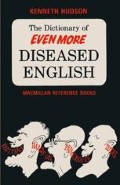Abstract
Habits. For some unexplained reason, ‘ways’ is a classier word than ‘habits’ among social anthropologists and social scientists generally. One finds it in such contexts as ‘Patterns in Urban Food Ways: an Example for Early Twentieth Century Atlanta (catalogue, Academic Press, New York, 1982). This supposed superiority of ‘ways’ over ‘habits’ is probably caused by a feeling that ‘habit’ is slightly patronizing or derogatory, that is, it indicates an attitude on the part of the observer, a ‘value-judgement’, which the true scholar must avoid at all costs. ‘Ways’, by contrast, is objective, pure, uncontaminated by personal prejudice. There is, of course, no need to fall in with some absurdities, but it is as well to be aware of them.
Access this chapter
Tax calculation will be finalised at checkout
Purchases are for personal use only
Preview
Unable to display preview. Download preview PDF.
Copyright information
© 1983 Kenneth Hudson
About this chapter
Cite this chapter
Hudson, K. (1983). W. In: The Dictionary of Even More Diseased English. Palgrave Macmillan, London. https://doi.org/10.1007/978-1-349-06516-5_23
Download citation
DOI: https://doi.org/10.1007/978-1-349-06516-5_23
Publisher Name: Palgrave Macmillan, London
Print ISBN: 978-1-349-06518-9
Online ISBN: 978-1-349-06516-5
eBook Packages: Palgrave Social & Cultural Studies CollectionSocial Sciences (R0)

